 Petzlover
Petzlover Chippiparai is originated from India but Kooikerhondje is originated from Netherlands. Chippiparai may grow 23 cm / 10 inches higher than Kooikerhondje. Chippiparai may weigh 9 kg / 20 pounds more than Kooikerhondje. Both Chippiparai and Kooikerhondje has almost same life span. Both Chippiparai and Kooikerhondje has almost same litter size. Both Chippiparai and Kooikerhondje requires Low Maintenance.
Chippiparai is originated from India but Kooikerhondje is originated from Netherlands. Chippiparai may grow 23 cm / 10 inches higher than Kooikerhondje. Chippiparai may weigh 9 kg / 20 pounds more than Kooikerhondje. Both Chippiparai and Kooikerhondje has almost same life span. Both Chippiparai and Kooikerhondje has almost same litter size. Both Chippiparai and Kooikerhondje requires Low Maintenance.
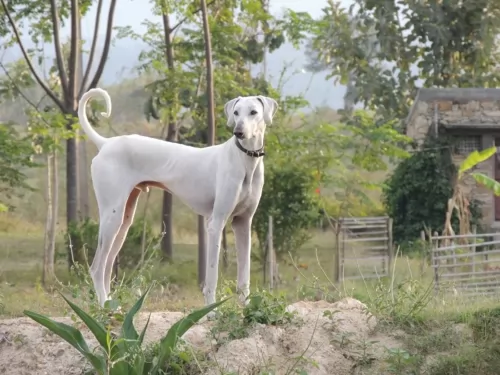 The Chippiparai is a working dog found in India and until recently there has been little interest in the purity of any breed, but rather only an emphasis on the abilities of the dog. They are only beginning to research the origin and history of their native dogs such as the Chippiparai. Not much is known about the origin of the breed except that it is found almost exclusively in Tamil Nadu and Keraia in the southern part of the subcontinent of India. Other than this there is much speculation about the breed’s origin but very little-known facts. It is indeed an ancient breed; however, its origin could be thousands of years ago or simply hundreds of years ago.
The Chippiparai is a working dog found in India and until recently there has been little interest in the purity of any breed, but rather only an emphasis on the abilities of the dog. They are only beginning to research the origin and history of their native dogs such as the Chippiparai. Not much is known about the origin of the breed except that it is found almost exclusively in Tamil Nadu and Keraia in the southern part of the subcontinent of India. Other than this there is much speculation about the breed’s origin but very little-known facts. It is indeed an ancient breed; however, its origin could be thousands of years ago or simply hundreds of years ago.
• Perhaps it is a descendant of the Saluki as it resembles this breed quite a bit. It has been believed for some time that the Saluki is the original sighthound and the source of all sighthound breeds. The Saluki was very popular in the Middle East, especially in Persia and Arabia from which it could easily have spread to India. It would then have been shared from Northern India to Southern India where the Chippiparai is found.
• Perhaps the Chippiparai is a descendent of sighthounds from Central Asia and Afghanistan – the Tazi, Taigan, Hortaya Borsaya or the Afghan Hound. This part of Central Asia had more trade, influence and contact with the Indian subcontinent early in their history than with any other region. The Chippiparai is considered by some to be more like these sighthounds than like the Saluki and the interaction between these regions has a much longer history than the Middle East and India.
• It is also speculated that the Chippiparai might have been developed completely and uniquely from the local street and working dogs. With the civilization of India being one of the oldest in the world, it is considered a possibility that the Chippiparai is the descendent of the Harappan hunting dogs that probably were developed by the Indus Valley or Harappa roiling class.
Wherever the Chippiparai came from, they were the exclusive property of the wealthy and ruling castes. These upper castes were the only ones that could legally hunt with dogs or afford to feed one. The royal classes of Tiruneivell, Thanjavur, and Madurai all fed the popularity of the breed among the upper castes. They were coursing dogs used to chase down the prey once it was sighted. The Chippiparai are incredibly fast runners and would catch almost any prey and either hold it or kill it for their hunter. The Chippiparai, when not hunting, had to be chained so they would not chase any small animal that they saw. This confinement also added to the purity of the breed as random breeding was prevented.
The southern part of the Indian subcontinent is extremely hot with routine temperatures over 100’. The Chippiparai was developed to withstand these extreme temperatures and is more heat tolerant than most any other breed. They also need very little food and are resistant to the many parasites and diseases found in southern India.
Harboring the belief that Indian dogs were not as good as European ones, the occupying countries of Portugal, France, and Britain, had no interest in the Chippiparai, again leaving the breed to develop naturally on their own with little or no interbreeding. They also received no formal recognition because Indian culture only valued the dog for its working abilities. There was no Indian Kennel Club until 1956.
The Chippiparai is now very rarely and only found in the area of its birth. Many believe the breed is in danger of becoming extinct and even though it is now registered with Indian Kennel Clubs it is not often shown in their dog shows. Lovers of the breed are now attempting to get Indians to recognize that the Chippiparai is a great companion animal and attempting to save the breed.
 The Kooikerhondje is of Dutch ancestry and is a medium-sized spaniel-type dog breed that has always been a working dog, being used to attract ducks into traps but being bred as an all-purpose dog.
The Kooikerhondje is of Dutch ancestry and is a medium-sized spaniel-type dog breed that has always been a working dog, being used to attract ducks into traps but being bred as an all-purpose dog.
They were particularly sought after in the 17th and 18th century, appearing in paintings of Rembrandt. The breed died out during World War II, but it was rescued by Baroness van Hardenbroek van Ammerstol and recognized by the Dutch Kennel Club.
In January 2018 the Nederlnadse Kooikerhondje is fully recognized by the American Kennel Club, competing in the Sporting Group.
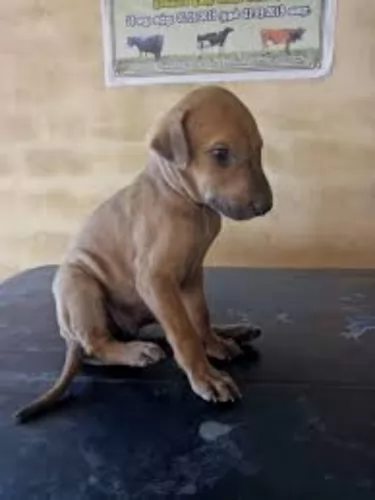 The Chippiparai is a typical sighthound although their size and appearance will vary more than that of registered purebred sighthounds. Typically, they will have a long, domed head with small erect ears and dark eyes. Their muzzle will be as deep and wide as the skull but longer. Their legs are straight and long, their chest is roached back and deep, giving them, an appearance very similar to a greyhound or other sighthound.
The Chippiparai is a typical sighthound although their size and appearance will vary more than that of registered purebred sighthounds. Typically, they will have a long, domed head with small erect ears and dark eyes. Their muzzle will be as deep and wide as the skull but longer. Their legs are straight and long, their chest is roached back and deep, giving them, an appearance very similar to a greyhound or other sighthound.
They have a long curly tail, and their coat can vary greatly in color. They are medium sized, and their coat is short, shiny and close. He is very slender and sleek, which along with his long legs gives him that incredible speed. They are thin with visible ribs.
 The Kooikerhondje is a medium sized dog standing at 35 – 40cm at the withers and weighing anything between 9 – 11kg. He has a medium length coat which is a red and white color, with floppy ears.
The Kooikerhondje is a medium sized dog standing at 35 – 40cm at the withers and weighing anything between 9 – 11kg. He has a medium length coat which is a red and white color, with floppy ears.
A distinctive feature with this dog is the black tips of the long ears, and which are referred to as earrings. The coat can be wavy or straight. Typical of spaniel-like dog his plumed white tail moves jauntily, as though always happy. When you look at him he has a gentle expression, while being alert too.
Friendly, content, cheerful, good-natured and quiet – these are some of the words which describe the amicable Kooikerhondje.
He is also intelligent, wanting to please his owner. He is good around children too, but make sure your children are taught to respect and be kind to animals.
The Kooikerhondje is an adaptable dog and can be as as quiet or as jaunty as you want. He is adaptable to city life or life in the country, but he will need to be exercised and taken for walks.
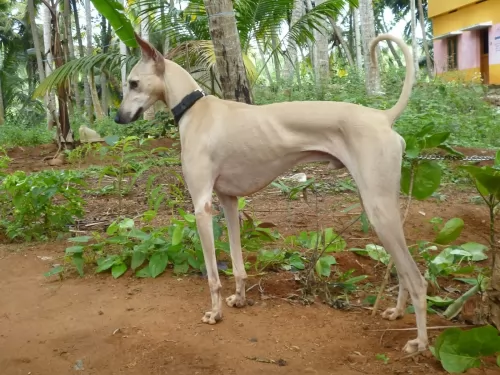 The Chippiparai is a loving, gentle family dog if well socialized, well trained and well exercised. They are very intelligent and need human companionship. Once they are living with a human family, they are very protective of that family. They are for the most part peaceful and quiet dogs. They are loyal and loving but they are not overly affectionate. Cuddlers they are not, and they do not like to play rough with children.
The Chippiparai is a loving, gentle family dog if well socialized, well trained and well exercised. They are very intelligent and need human companionship. Once they are living with a human family, they are very protective of that family. They are for the most part peaceful and quiet dogs. They are loyal and loving but they are not overly affectionate. Cuddlers they are not, and they do not like to play rough with children.
Accepting and loving within the family, the Chippiparai are equally hesitant and shy around strangers. They can be suspicious, but they are not aggressive. They are just very aloof with strangers, yet they hardly ever bark.
 Kooiker, as he’s fondly referred to for short, has a happy personality, and bringing him into your home will be like bringing in some joy and sunshine.
Kooiker, as he’s fondly referred to for short, has a happy personality, and bringing him into your home will be like bringing in some joy and sunshine.
He is a fun, energetic companion and you can count him in for all your outdoor activities such as walk, hikes and swimming. He’ll love to fetch every ball you throw, and that’s because he is such a playful dog.
He is a loving dog too, making a great playmate for children. Treat him like one of the family, and the Kooiker will surprise you with the amount of pleasure he brings.
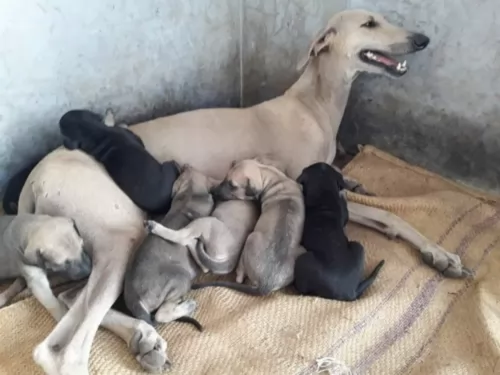 There are no clinical studies regarding the health and health history of the Chippiparai, so little is known about their long-term health. However, most who know the breed, believe it is an incredibly healthy one. They seem to have a lot less genetically transmitted health issues than other purebreds. Because of their isolation for centuries in India, they have developed immunities and resistance to most parasites and diseases other dog suffer from.
There are no clinical studies regarding the health and health history of the Chippiparai, so little is known about their long-term health. However, most who know the breed, believe it is an incredibly healthy one. They seem to have a lot less genetically transmitted health issues than other purebreds. Because of their isolation for centuries in India, they have developed immunities and resistance to most parasites and diseases other dog suffer from.
Because of this you should look for the types of issues that occur in dogs of this size and build. Have them tested by the Canine Eye Registration Foundation and the Orthopedic Foundation for Animals.
 The lifespan of the Kooikerhondje is about 12 – 14 years, and looked after well, he can be your canine friend for many years.
The lifespan of the Kooikerhondje is about 12 – 14 years, and looked after well, he can be your canine friend for many years.
He loves his food and can put on weight easily, and obesity is one of the health problems he may have to deal with. Kidney- and eye problems might also be something that you may have to deal with with this dog breed, although most unlikely.
Obesity in dogs is very sad because its a disease that can be avoided. Dogs that are over fed are at particular risk because they can't exercise, and this in itself can lead to serious health issues.
There are different causes of obesity, but it is mostly caused by the dog being fed- and eating more than he can expend. Just like with humans, obesity becomes more common in old age as the metabolism slows down. A dog that has been neutered or spayed also tends to put on weight more easily.
If you're unsure what to do for your obese dog, speak to your vet who can recommend a diet for your pet. Remember that with feeding your dog, prevention is better than cure.
Kidney problems, though more common with older dogs, can strike at any age. The kidneys play a host of important functions such as regulating blood pressure. Sometimes kidney failure is slow and the symptoms may not be obvious.
With renal failure, your pet will be lethargic, they will be vomiting, be depressed and have weight loss. Other possible symptoms are increased thirst, blood in the urine and seizures. Chronic renal failure can't be cured but treatment is aimed at making your pet comfortable.
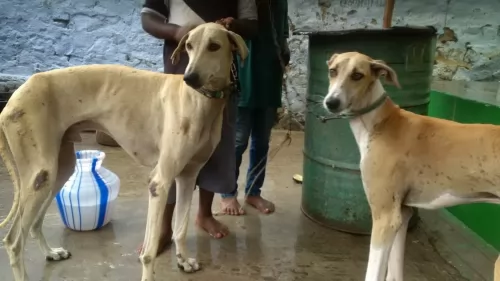 Do not overfeed your Chippiparai. Feed twice a day and no more than a total of 2.5 cups of high quality dry food.
Do not overfeed your Chippiparai. Feed twice a day and no more than a total of 2.5 cups of high quality dry food.
As mentioned previously the Chippiparai seems to have no genetic diseases or issues and very few acquired ones. However, he is sensitive to anesthesia and some foods. He is intolerant to cold weather and has a hard time with his pads on hard surfaces. Some Chippiparai might experience some of the ailments other breeds like them experience.
Both Elbow and hip are possible. This can cause arthritis and lameness. This occurs when the bone does not fit well into the joint.
This can cause lameness as well. The kneecaps slide over the knee instead of staying in place.
This is a hunting dog and he will want to hunt. They are incredibly fast and need the opportunity to run. Brisk walks will not be enough for this dog. He is very energetic. They will chase any small animals. It is not recommended that you have small pets even small dogs or cats with a Chippiparai. Having been bred for centuries to hunt, they are not likely to respond to any commands if they are off lease and chasing prey. Do not allow them to be off leash unless in a fenced area, and that fence needs to be 8 feet tall as they can easily jump a seven-foot fence. Try they at coursing, agility, fly ball and frisbee competitions.
 Your Kooikerhondje is smart, happy-go-lucky dog and it is important to know your pet's needs so you can care properly for him. Exercise your Kooikerhondje daily as he is a high-energy dog and even short walks can be good for him.
Your Kooikerhondje is smart, happy-go-lucky dog and it is important to know your pet's needs so you can care properly for him. Exercise your Kooikerhondje daily as he is a high-energy dog and even short walks can be good for him.
He absolutely loves balls games too. He can live in the city or the country but will do better when he has the chance for exercise. Urban- and city environments can work if there are nearby parks to cater for his energy.
The Kooikehondje has long hair but he is surprisingly low maintenance and will simply require a brush once or twice a week.
If you love your pet but just can't find the time to see to his grooming needs, take him to the vet for regular checkups to check ears, teeth and eyes. They can come down with problems with the eyes or have some or other skin allergy.
Give your Kooikerhondje the right food, and make sure its the highest quality. If you buy him commercially manufactured food, pay attention to the ingredients list and make sure that proper meat is at the top of the list.
Add cooked chicken, brown rice and vegetables to his dry kibble as a tasty treat sometimes. Learn to recognize the less nutritious ingredients such as wheat or grain. Also learn to avoid foods which are bad for your dog such as chocolate and onions.